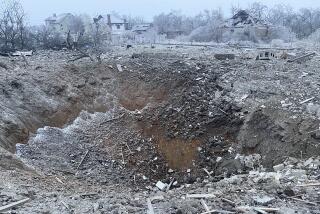U.N. Calls for at Least 7,500 Troops for Bosnia Safe Areas : Balkans: The figure falls well short of the number needed, the secretary general reports. He says the threat of air strikes may compensate.
UNITED NATIONS — The United Nations needs but knows it cannot recruit 34,000 more troops to guard the six safe areas of Bosnia-Herzegovina, so it will have to start doing the job with only 7,500, Secretary General Boutros Boutros-Ghali informed the Security Council on Monday.
The smaller numbers might serve as a deterrent if augmented by the air power promised by the United States and other NATO countries, Boutros-Ghali said in his report to the council.
“While this option (of 7,500 troops) cannot, in itself, completely guarantee the defense of the safe areas,” the secretary general said, “it relies on the threat of air action against any belligerents.”
In an interview, Kofi Annan, the Ghanaian who serves as undersecretary general for peacekeeping, said that “time will tell” whether there would be enough cooperation from the Bosnian Serbs to allow the U.N. forces to protect the enclaves with such small numbers.
“I’m not optimistic about getting the cooperation immediately,” he added.
The secretary general’s report came as members of the council were obviously disturbed by dispatches about Bosnian Serbs shelling some of the Muslim-inhabited enclaves with impunity.
Bosnia’s Muslim-led government, which fears that the areas would become nothing more than refugee camps dependent on outside aid, reluctantly accepted the plan only last week. It asked that the areas be enlarged to include “economic zones” around them, linked by U.N.-protected corridors, and that Serbian heavy weapons be withdrawn from around them.
Boutros-Ghali did not detail where he expected to recruit the 7,500 new troops but said, “On the basis of initial contacts with member states, I am hopeful of obtaining most of the military personnel immediately required.”
But those governments offering troops, he continued, did not possess the armored personnel carriers, communications equipment, weapons systems and logistic support needed for these troops to protect the enclaves.
“I would therefore appeal to member states, especially those who are not in a position to provide additional troops, to make contributions of such equipment,” Boutros-Ghali said.
This seemed like a direct appeal to the Clinton Administration, which has refused to provide any combat troops to the former Yugoslav federation except for a token force of 300 in Macedonia.
Boutros-Ghali said that the use of air power would be coordinated between the North Atlantic Treaty Organization and the United Nations, but he added, “It is of course understood that the first decision to initiate the use of air resources . . . will be taken by the secretary general in consultation with . . . the Security Council.”
The secretary general added that he had received an assurance from NATO that it would offer “protective air power in case of attack against (the U.N. peacekeeping force) in the performance of its overall mandate.”
There has been a good deal of confusion about whether NATO air power would be used to protect civilians as well as the peacekeepers under attack. Undersecretary General Annan said the United Nations has interpreted the NATO promise to mean that the planes would strike at the Serbs if they attack peacekeepers or civilians.
The dispatch of 7,500 troops would augment a force of 9,000 peacekeepers now engaged in protecting relief operations and convoys in Bosnia.
More to Read
Sign up for Essential California
The most important California stories and recommendations in your inbox every morning.
You may occasionally receive promotional content from the Los Angeles Times.










